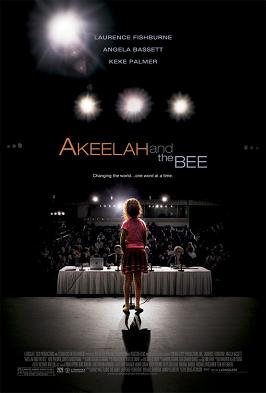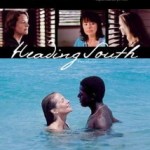Movie Review: AKEELAH AND THE BEE (2006)

Akeelah and the Bee (2006)–***
What are the chances that a brainy girl in South L.A. could get the gangbangers, the bullies, her troubled family and the rest of the community to come together for a National Spelling Bee championship? It’s not very likely. Not very likely at all. Which is just one of the reasons I loved Akeelah and the Bee.
Akeelah is an 11-year-old African-American girl who happens to have a penchant for spelling. As a student at a predominantly black, low-scoring middle school in South L.A., Akeelah’s run-ins with bullies who want the smart girl to do their English homework and boredom in classes that aren’t taken seriously by her peers lead to constant absenteeism. The latter also leads to a potential trouble with the school administration.
But Akeelah’s Principal (Curtis Armstrong) has a plan. He gets Akeelah to compete in the school’s spelling bee (she wins, of course) and then hires former UCLA English Professor Dr. Larabee (Laurence Fishburne) to coach Akeelah as she competes in the district, the regional and national bees. She earns credit toward the classes she missed, which will make her mother (Angela Basset) happy, but she also develops the knowledge and confidence to go for the national title and change her community at the same time.
Akeelah and the Bee gets away with a lot because it is a singularly important film. Why is it when Akeelah is considered a brain in the predominantly black public middle school that she is bullied? Why is it that her friends and family have a hard time encouraging her success? I remember Spike Lee giving a speech and discussing the idea of education being a white thing in parts of the black community. With Akeelah and the Bee, that idea is addressed in a noble and inspiring way.
Through its sugarcoated narrative and teacher/student film clichés, Akeelah and the Bee unpacks the idea of education in the black community and it does it without a sports narrative. (There’s even a funny moment in the film where such sports films are parodied.) Sure, I don’t wholly buy the way the film pans out, with Akeelah’s thug brother helping her with flash cards or the bullies cheering for her when they watch the national bee on TV. What makes Akeelah such a remarkable film is that it makes me want to believe everything will work the way it does.
In many ways, the story of Akeelah is the same story we saw in Whale Rider. Writer/director Doug Atchison, however, is no Niki Caro. Akeelah doesn’t have the emotional resonance of Caro’s film about a Maori girl who changes her community. Instead, the film exchanges such resonance for awkward and oversentimental moments. Still, Keke Palmer has a compelling enough personality to make you want her character to succeed.
Palmer doesn’t have standout moments, but she certainly has the command of her role that is unusual in most young actors. Her performance is complimented by veteran Lawrence Fishburne’s genuine and heartening performance as a reclusive college professor (not unlike Sean Connery’s reclusive writer in Finding Forrester). Fishburne, even more than Palmer is able to overcome the shortcomings of his written character to produce a sensitive portrait of a haunted man. If anyone from this film deserves some sort of recognition (maybe even an Oscar), it’s Fishburne.
The success or failure of a film like Akeelah all depends on if you can get the audience to fall for your tricks. Short of a few eye-rolling moments that are more suited for a Disney film, I couldn’t help falling for Akeelah. Granted I did fall more for its intentions than the actual story, butAkeelah is a splendid achievement for its determination, above all else.











Thanks for the sensible critique. Me & my neighbor were just preparing to do a little research on this. We got a grab a book from our area library but I think I learned more clear from this post. I’m very glad to see such excellent info being shared freely out there.